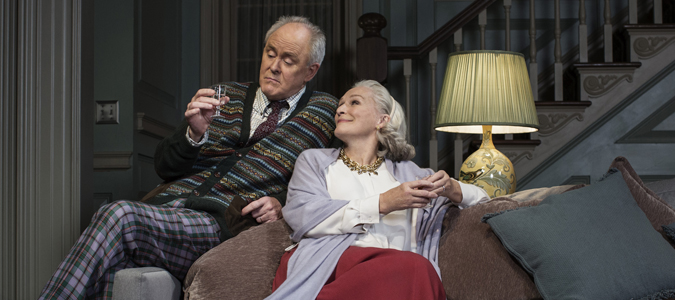

A Delicate Balance
Opening Night: November 20, 2014
Closing: February 22, 2015
Theater: John Golden Theatre
In A Delicate Balance, Agnes (Glenn Close) and Tobias (John Lithgow), a long-married couple, must maintain their equilibrium as over the course of a weekend they welcome home their 36-year-old daughter (Martha Plimpton) after the collapse of her fourth marriage, and give shelter to their best friends (Bob Balaban and Clare Higgins), all the while tolerating Agnes’ alcoholic sister Claire (Lindsay Duncan).
BUY TICKETSREAD THE REVIEWS:
November 20, 2014
The setting for Edward Albee’s A Delicate Balance is “the living room of a large and well-appointed suburban home,” and scenic designer Santo Loquasto has conjured the scene so sumptuously at Broadway’s Golden Theatre that you can practically hear the tennis balls being hit at the country club down the road. Director Pam MacKinnon, who won a Tony for her staging of Who’s Afraid of Virginia Woolf?, has paid exquisite attention to surface detail in her handsome revival starring Glenn Close and John Lithgow. But then, refined upholstery and the correct shade of paint, to say nothing of an exquisitely arranged bar, are crucial in a play about upper-class characters who have buried the truth of their lives under expensive trappings. Part drawing-room comedy, part existentialist drama, A Delicate Balance blends Noël Coward with Samuel Beckett in a work that bears all the hallmarks of Albee’s central preoccupations as an artist: the domestic rancor inflamed by booze, the free-flowing anxiety that can’t be pinned down, the lost child that has created a marital vacuum and the curiously fussy language that bounces between comic attack and philosophical conjecture. Whether this Pulitzer Prize-winning play, first done on Broadway in 1966, represents the author at his best remains an open question. A Delicate Balance has neither the savage vigor of Who’s Afraid of Virginia Woolf? nor the stylistic ingenuity of Three Tall Women.
READ THE REVIEWNovember 20, 2014
If you’re going to do an Edward Albee play, you better be sure you have your bar pretty well-stocked. The Who’s Afraid of Virginia Woolf playwright loves to get his characters liquored up. It seems to help their deep secrets and personal demons bubble to the surface more quickly. You know — the whole “finding yourself in the bottom of a glass” thing. There’s a lot of that in A Delicate Balance, Albee’s 1967 Pulitzer Prize-winning domestic drama that’s just opened at the John Golden Theater. In the stellar revival, from Tony-winning director Pat MacKinnon, the bar so integral to the story, it might as well be another character in the play. It won’t get entrance applause, though. That honor goes to three-time Tony winner Glenn Close, who is making her a triumphant return to Broadway after 20 years away. (Her last role on the boards was as Norma Desmond in Andrew Lloyd Webber’s 1994 mega-musical Sunset Boulevard). A Delicate Balance proves to be the perfect vehicle for Close. In the ensemble piece, she plays Agnes, a poised upper-middle-class suburban matron determined to keep everyone in her life in balance.
READ THE REVIEWNovember 20, 2014
Everybody knows Edward Albee’s ho’s Afraid of Virginia Woolf?” Not so A Delicate Balance, which came along four years later, in 1966, and failed to make the same culture-shifting stir. Though it won the Pulitzer Prize that Virginia Woolf absurdly failed to nail, the first production ran for only 132 performances, and the 1996 Broadway revival, despite glowing reviews, didn’t do much better. While A Delicate Balance is now seen regionally with some regularity, I doubt it would have returned to Broadway for a third try were it not for Glenn Close, who was last seen there 20 years ago and whose inclusion in the cast is making it—at last—a very hot ticket indeed. Aside from Ms. Close’s presence, what has changed about A Delicate Balance in the intervening half-century is that its author has metamorphosed from American theater’s angry young man into its grumpy elder statesman. In between he was seen as a back number, a writer of eccentric, sometimes impenetrable plays who after Virginia Woolf couldn’t get a good review to save his life. At length the critical tide turned, but Mr. Albee is still what he always was, a wildly uneven author whose worst plays are so bad that it hardly seems possible that they were written by the same man who gave us the best ones. Where does A Delicate Balance fall on that spectrum? At its best, it’s thought-provoking and sometimes challenging, but it takes a long time to get moving, and I wonder whether modern-day audiences will be willing to wait for it.
READ THE REVIEWNovember 20, 2014
“Time happens, I suppose. To people. Everything becomes…too late, finally.” Thus opines matronly Agnes (Glenn Close). No, she has not been asked to summarize the plot of A Delicate Balance, the Edward Albee parlor puzzler in which she appears—although if you don’t let in this desolating, resonant piece (via brain or heart), it might indeed seem little else than two talky hours. When Balance opened in 1966, respectable critics derided the play as hollow and empty. They’d confused the medium for the message. A stony stare at varieties of moral vacancy, the play itself is full to bursting. What it churns with, most obviously, is lapidary verbiage. Albee’s characters don’t simply engage in idle suburban chitchat as they guzzle martinis or sprawl over Santo Loquasto’s cozy, plush set. They twist their souls into pretzeled locutions about the state of their minds, measuring the exact geometrical shape of their relations. Agnes begins with a Jamesian self-examination of incipient madness; her passive husband, Tobias (John Lithgow), ends the third act with an anguished, orgasmic aria to his friend, imploring him to stay—for reasons not even Tobias can understand. He’s not alone; this is a deliberately cryptic fable of love and betrayal, and its characters teeter precariously between extremes of morbid stasis and fatal chaos.
READ THE REVIEWNovember 20, 2014
Hope arrives in the form of dread toward the end of the first act of Edward Albee’s A Delicate Balance, which opened on Thursday night in a revival at the Golden Theater. Up to that point in this production, directed by Pam MacKinnon, it’s been hard to detect much feeling of any kind within the carefully color-coordinated, dust-free, energy-free environs that have been installed onstage. To be sure, the three talented and celebrated people we have been watching up there thus far — Glenn Close, John Lithgow and Lindsay Duncan — have been delivering their characters’ zingers and stingers with crispness, clarity and, when one feels an important theme coming on, heavy italics. Yet they have the distant, flattened dimensions of specimens under glass. You feel that if you left them for a while, when you returned, they’d still be more or less frozen as they were before. But then — oh, sweet deliverance — here come good old, miserable, intrusive Harry and Edna to shake things up. They’re the best friends of Tobias and Agnes (Mr. Lithgow and Ms. Close), the owners of the tasteful mausoleum for the living (i.e., lovely suburban home) that is the setting for Mr. Albee’s Pulitzer Prize-winning drama of 1966.
READ THE REVIEW




















